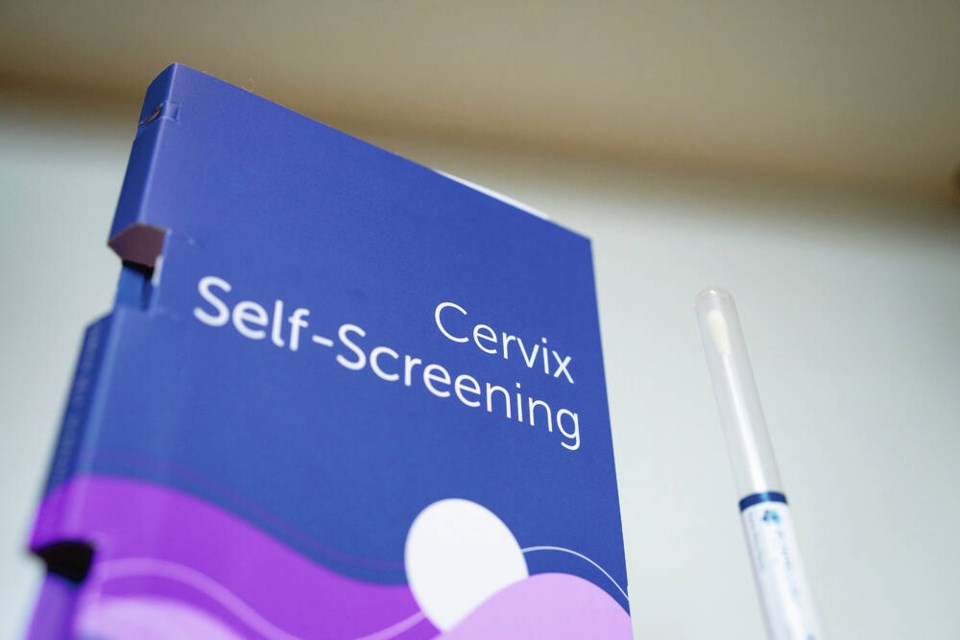B.C.’s health minister said almost 30,000 people in the province have ordered HPV screening tests since January as he shared first-year achievements and shortcomings of the 10-year Cancer Action Plan.
The plan, which aims to improve efforts to prevent, detect and treat cancers, was launched in February last year.
“We’ve made significant progress in this year, but in year two we need to build on that progress,” Adrian Dix said. “There is work to do. Where we are not doing good enough, we have pledged to do better and we have the resources to do better.”
As part of cancer screening, the province launched the country’s first HPV self-screening program on Jan. 29 to catch the virus that can cause cervical cancer.
Since launching this year, 29,724 cervix self-screening kits, including 5,748 in Island Health, were distributed.
HPV vaccinations have increased, with 76 per cent of 17-year-old females and 73 per cent of males having received the recommended two doses as of March 31. The national target is 90 per cent coverage.
The province plans to use its Get Vaccinated registration and booking system to alert eligible individuals on how to get their free HPV shot.
“We can eliminate cervical cancer in this province,” Dix said.
Amongst the improvements made in the reporting period April 1, 2023 to March 31, 2024 is the hiring of 71 oncologists (not full-time equivalent positions), 32 additional radiation therapists, and eight Indigenous patient navigators, according to the .
“We’ve made very significant, huge investments in the people who work in our cancer care system and provide extraordinary care for ourselves and our loved ones,” Dix said.
In terms of preventing and detecting cancer earlier, the province reports 27,326 more mammogram, colon and lung screenings this year, a 6.6 per cent increase in medical oncology consultations, and a nine per cent increase in IV chemotherapy treatment starts.
And in May last year B.C. Cancer increased its PET/CT screening capacity by expanding hours in regions across the province including in Victoria.
As of October 2023 there were 25 scans performed daily up from 16 per day at B.C. Cancer in Victoria. At the same time B.C. Cancer implemented a provincial referral program giving patients the choice to travel to another regional centre to get their diagnosis sooner.
The increase in urgent cancer surgeries, an area Dix said needed improvement, was up just 153 surgeries or 1.1 per cent, over the last year.
The number of urgent cases that received surgery within four weeks was 63.8 per cent with 82 per cent of urgent cases receiving surgery within six weeks, both up less than 1 per cent. Neither increase is “good enough,” said Dix. The provincial target is 80 per cent of urgent cases being done within four weeks.
“We need to do more to reduce wait times for urgent surgeries,” Dix said. “We’re committed to meeting and exceeding the provincial target of 80 per cent of urgent cases receiving surgery within four weeks.”
Radiation treatments for cancer treatment is also an area where the province is struggling.
While B.C. delivered 177,096 radiation treatments over the last year, a 4.7 per cent increase, it continues to send eligible patients waiting outside benchmark wait times for breast and prostate cancer radiation treatments to Bellingham, Washington. A total 599 patients (457 breast cancer; 142 prostate cancer) completed radiation therapy there.
The province says 76.1 per cent of people received radiation treatment within the benchmark of four weeks, an increase of 11.1 per cent.
The province plans to continue to extend hours of operation for radiation treatments across B.C. to meet demand.
Dix referenced the introduction of CAR-T cell therapy in B.C. for people with certain advanced leukemias and lymphomas and 63 new clinical trials opened over the last year with 157 total active clinical trials enrolling participants “in every part of B.C.” in 2023.
CAR-T therapy, a form of immunotherapy which for some has become a life-saving treatment option where other forms of cancer treatment have failed, began in April at Â鶹´«Ã½Ó³»General Hospital. Previously, eligible patients were referred out of province or country to undergo CAR-T therapy
Dr. Kim Chi, chief medical officer for B.C. Cancer said in addition to hiring an “unprecedented” number of new specialists and other clinicians, the province has made available 12 new anti-cancer drugs and introduced 58 new systemic therapy protocols, “all with proven benefits for patients.” “This means more options leading to longer and better lives for people that have to deal with cancer,” said Chi.
There was $90 million in annual funding allocated for B.C. Cancer in 2023-2024 and a further $90 million added for 2024-2025.
>>> To comment on this article, write a letter to the editor: [email protected]



